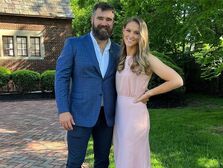How to Plan a Wedding From Start to Finish In 2024
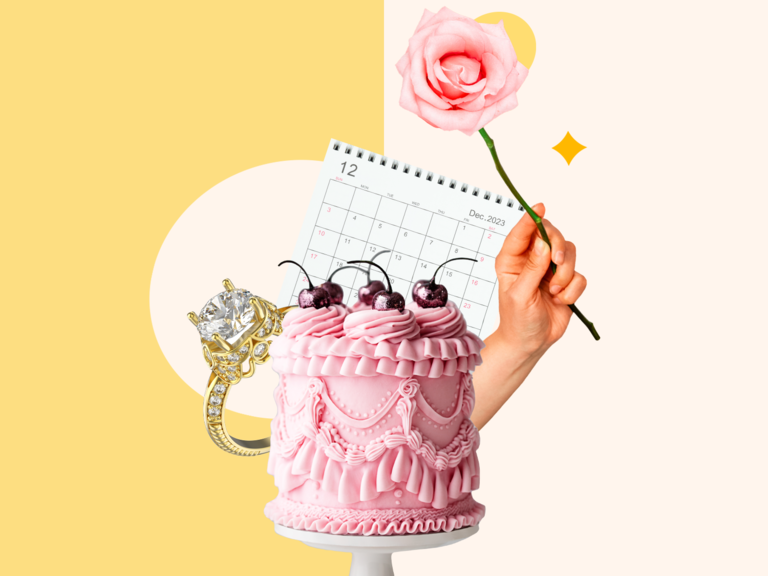
"How do you plan a wedding?" There's a good chance that those words crossed your mind shortly after your partner asked you to marry them. Wedding planning is a big task and you might be feeling overwhelmed if you don't know how to start planning a wedding. Don't fret—we're here to help with an easy-to-follow wedding planning guide that'll making planning a wedding a breeze.
The Knot has all the tools you need to take your wedding from inspiration to action. And below we're giving you a big-picture look at how to utilize our wedding planning resources to get rolling on your wedding plans—consider this wedding planning 101. In this easy, no-fuss wedding planning guide, you'll learn everything you need to know about how to actually bring your big day to life.
There's no "right" way to plan your wedding because your special day should be as unique as your relationship. But, if you need some help to get started planning a wedding, we tapped a few seasoned industry experts to share the most important tasks you need to know, in the general order you should aim to complete them. So what are you waiting for? Let's get started with your wedding plans.
1. Take Stock of Your Wedding Planning To-Do List
While the 50 steps we've outlined here paint a broad picture of how to plan a wedding, we also have a nuts-and-bolts comprehensive planning checklist for once you're ready to really dig into the details and minutiae. Our in-depth wedding planning checklist includes each and every task you need to complete, down to the smallest detail. Once you've gotten a handle on the big picture, your next step is to dive into your to-do list that'll quickly become your wedding planning BFF.

2. Utilize Technology to Help With Wedding Planning
What's better than a wedding planner in your pocket? The Knot App, which is completely free, is just that. Many of the steps to planning a wedding that we outline below (like researching vendors and building a wedding registry) can be completed with ease right from your phone via The Knot App. One user notes that they had been "searching for the best wedding planning app. I couldn't be happier that I picked The Knot. Planning my wedding was super easy because of it."

3. Find Your Wedding Vision
Before you dive into too many of the big decisions connected to your wedding plans, we recommend thinking about the big-picture vision you have for your wedding day. What time of year do you want to host your celebration? What wedding style sparks your interest? Are you drawn to intimate, outdoor boho parties, or would you rather have a glam formal affair at a chic city rooftop? These are key details to consider before you move forward with any wedding planning decisions. "I always ask my couples to describe their perfect wedding day," says Mary Thornton, founder of Connecticut-based stationery boutique and event planning company Party Party. The pro, who boasts more than 13 years of experience, encourages to-be-weds to consider their vision: "Is it casual? Formal? Large? Small? Do you prefer formal and elegant, or do you want a fun, casual dance party? Once that decision is made the other ones fall into place."
Start wedding planning by determining the vision for your wedding. Now's the time to really narrow down what you want your day to look like. Do your wedding plans involve a candlelit evening in a mansion or a barefoot ceremony on a tropical beach? While you're picturing your perfect wedding, here are some key questions to answer now: Will you have a big or small wedding? Will your party be outdoors or inside? Will it take place at home or at a special destination? Will you choose a specific theme, or are you inspired by a certain wedding style, like modern, classic, romantic, vintage, rustic or all-out glam?
To help you get a better idea of what you want (and what you don't want), take our fun Style Quiz that takes all the guesswork out of creating your dream wedding vision, then matches you with beautiful venues and pros that fit your style. Having a clear wedding vision will make your big day much more memorable to guests. "The aesthetic of your wedding is everything," says Cathleen Holloway, founder of Texas-based design and event company Holloway Events since 2015. "As we always say, the beauty is in the details."
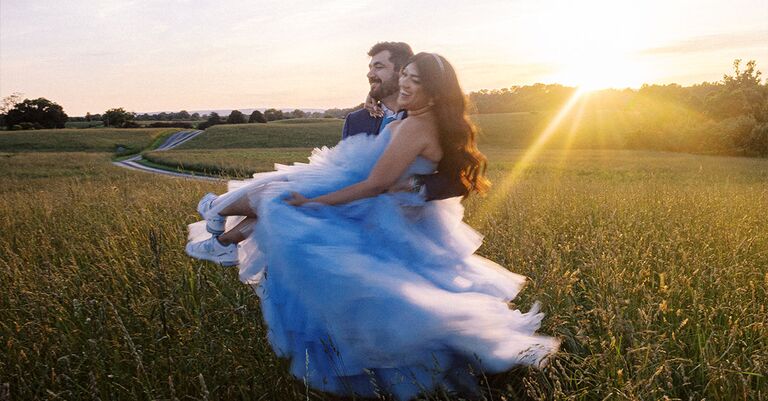
4. Gather Inspiration to Match Your Vision
After taking The Knot Style Quiz and identifying the general vibe you envision, start to gather wedding inspiration that aligns with your chosen aesthetic. When you start hiring vendors, it can be extremely helpful to have a mood board that highlights your favorite wedding ideas, as well as the aesthetic you'd like to hone in on. Take your time gathering wedding inspiration during this stage of the planning process. Don't forget to check out magazines), social media and real wedding photos—and don't limit yourself to the obvious sources. Something as unlikely as a wallpaper pattern, a scene from a favorite movie, or a family heirloom can spark your creativity and guide your wedding plans. We also recommend browsing our yearly wedding trend report for fresh, of-the-moment ideas.

5. Establish Your Wedding Priorities and Expectations as a Couple
Before you begin hiring wedding vendors, purchasing wedding decor and shopping for attire, experts say that creating a priority list and mission statement is an essential step. "This is one of the starting conversations I have with my clients," says Holloway. "Everyone has different priorities when planning a wedding. For example, a client who's a self-proclaimed foodie is going to want to have the best food at their wedding, while a client who's obsessed with flowers will prefer lush displays included in their wedding plans. We categorize our must-haves and our wish list items and work from there on planning the wedding."
Establishing your priorities and expectations is a key part of the wedding planning process for two reasons. Not only will this guide budget allocation, it'll also help you and your partner remain aligned on what's most important to both of you while allowing you to compromise—and this is key for minimizing disagreements and conflict along the way. "It's essential to discuss upfront what each person's role will be and the related expectations," explains Damali Peterman, conflict resolution expert and founder of BreakThroughADR.
If you find yourself feeling overwhelmed, Peterman advises to address the concern respectfully, and as soon as it arises. "I often see frustration arise with couples when there's a breakdown in the communication, or if a miscommunication goes unaddressed," she adds. "Maintaining a frequent and open line of communication and leaning into difficult conversations will greatly minimize stress associated with wedding planning."

6. Set a Wedding Budget
Setting a budget is one of the first steps to planning a wedding. Once you've taken some time to daydream about what you want your wedding ceremony and reception to look and feel like, setting a wedding budget needs to take place before you can get started in earnest with planning the wedding.
After all, you can't move forward with any subsequent decisions until you know what you can afford to spend. One thing to note, though, is that you'll also need to think about your guest count as well, since your wedding size and budget go hand-in-hand. "The wedding budget and the guest list determine the rest of your planning, like where you'll get married, what kind of food you'll serve, whether you'll have a band or DJ, among others," Thornton explains.

7. Ask for Help When Needed
While setting the wedding, as well as throughout the entire process of planning your own wedding, communicating with key stakeholders and asking for help as needed is critical.
Early on, while making your wedding budget, it's necessary to sit down with your families and figure out if anyone is going to contribute financially, and how much. This number will affect every decision about how you plan your wedding, along with the purchases you make, so be intentional about setting aside this time to discuss expectations. While it may feel uncomfortable at first, having this budget discussion early on will keep you and any financial contributors aligned on your values and goals moving forward, thus preventing miscommunication or confusion. "Interactions with parents or other stakeholders who may be contributing financially to your big day may be a source of stress," says Damali Peterman, conflict resolution expert and founder of BreakThroughADR. "The key to navigating these interactions is to find ways to be appropriately vocal, using your best judgment to navigate the discussion, and only accept what you can tolerate."

8. Consider a Wedding Planner or Coordinator
If you have room in your wedding budget, we recommend hiring a wedding planner or a coordinator early in your planning timeline. A professional can help you know how to plan a wedding under your specific circumstances and needs. Alternatively, you can also hire a part-time consultant or coordinator to devise a wedding blueprint—including the budget, your schedule and lists of good vendor and site choices—before you launch solo into the preparations. Another option is a day-of wedding coordinator, who will make sure everything goes smoothly on your wedding day.
While you can absolutely plan your own wedding, having the expert guidance of a planner or coordinator will make your experience much more enjoyable and stress-free. "There's a difference between filling in a spreadsheet and looking at Pinterest photos and actually planning and executing a wedding," says Thornton. "A planner has worked on hundreds of weddings and has a depth of knowledge that is so beneficial. Figure out what your budget is for a planner and see if you can make it work because you won't be sorry."
And, as Holloway notes, a wedding planner will be exceptionally skilled at helping you navigate the challenges and changes that the wedding industry may experience over time. "Planners are experts in our field for a reason, and those that are still standing after navigating a pandemic will not steer you wrong," she says.
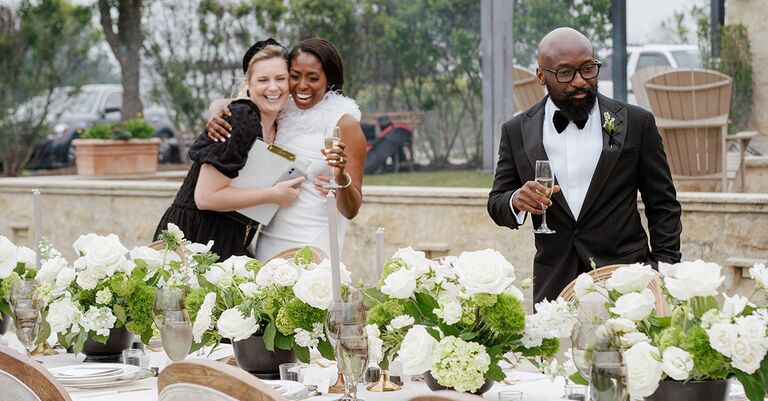
9. Set Your Date
One of the reasons that the question of how to start planning a wedding is so tricky is because there are a lot of different details that have to be planned concurrently as they affect each other. You can't finalize a wedding date without an available venue, but you need to know your own general availability before looking at venues. Similarly, you need to know your general budget and guest count before finalizing your venue, but those figures may be impacted by date and venue. In short, you should start the task of planning a wedding date early on, with the understanding that you need to leave room for flexibility before you officially lock the date in and sign on the dotted line.
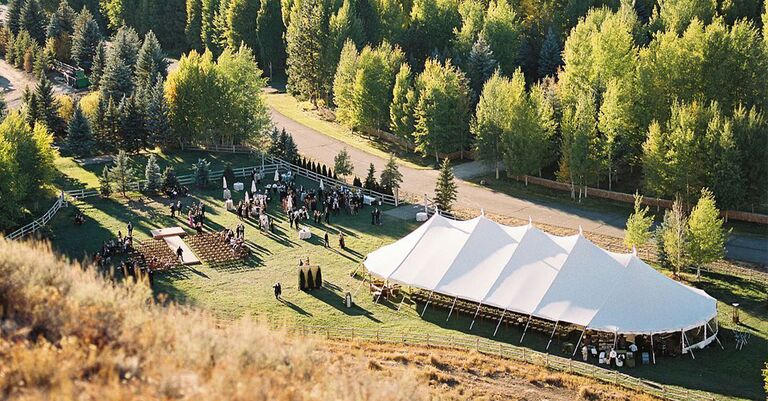
10. Research Venues & Take Site Tours
Remember that bit about multiple tasks happening at the same time because of the domino nature of them all? Well, now is the time in your wedding plans to research venues and start taking venue site tours. It may still be a bit of time until your venue is finalized, but proper research and exploration is key to ensuring you pick a location you adore as part of your wedding plans.
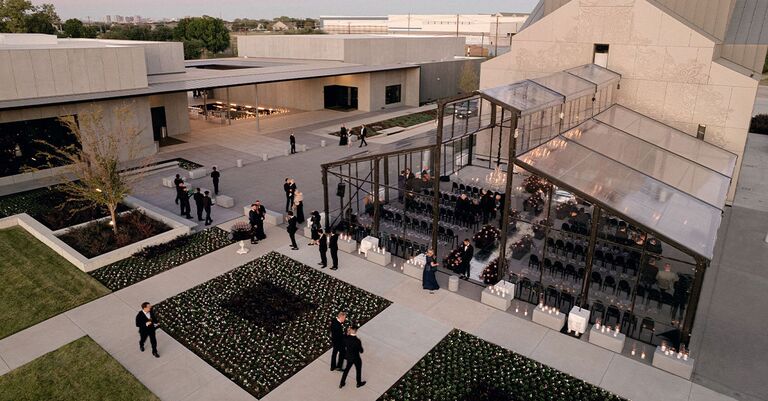
11. Book a Venue
Once you have a vision guiding your wedding day, you'll be ready to formally and officially set your date and book the setting. Your ceremony and reception venue will become the backdrop for virtually all your wedding photos—not to mention, it'll have the biggest impact on your budget and the overall vibe of your soiree. Ensure that you plan to get the look, price and extras you want by scouring local listings, shopping around, scheduling visits and booking early.
In years past, it was recommended to secure your wedding date and venue at least one year in advance. Now, post-wedding boom, we recommend completing this step as soon as possible as you plan the wedding. Because vendors and venues are quickly filling up, it won't hurt to get a head start by planning proactively.
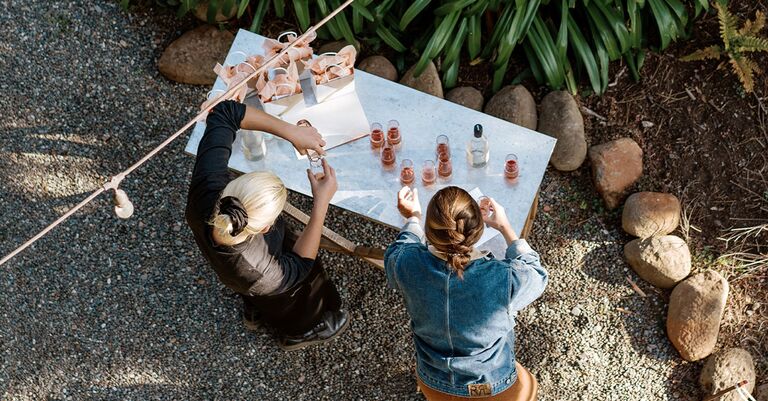
12. Hire Priority Wedding Vendors
If you just can't imagine getting married without a certain wedding band playing at the reception or a photographer whose work you love, act fast. Many in-demand wedding vendors are hired more than a year in advance, and once they're booked, they're gone. This is especially relevant for couples planning 2024 and 2025 weddings. Since vendors fill their schedules quickly, we recommend reaching out to your priority pros as one of the first steps to planning a wedding—you can even do so if you're choosing between a few wedding dates, as this will help you pick the day based on your must-have pro's availability.
While there's not necessarily an order you need to follow when booking pros, we recommend starting with a wedding photographer first. "The photographer makes your memories, and the photographs replace your memories over time so it's important to hire someone you trust," says Charleston-based photographer Lucy Cuneo. The pro, who has more than a decade of experience, notes that "if you really are in love with a specific photographer, I even recommend checking their availability before you pick your wedding date."
Beyond photographers, we recommend prioritizing venues, florists, caterers, rental companies, videographers and hair/makeup stylists first. You'll have more time later in your wedding planning journey to work with fashion designers, stationers, and niche entertainers (like a live painter or reception dancers).

13. Organize All Wedding Materials
If you want to know how to plan a wedding step-by-step, one thing rules above all else: organization. In addition to utilizing The Knot App and The Knot Checklist discussed above, you can also keep essential documents in a virtual, sharable space (like Google Docs) so you, your partner and any family members can share access and edit things together so that everyone is on the same page. But for those who prefer physical materials, you can never go wrong with a good, old-fashioned wedding notebook. After all, you'll need a place to store physical receipts, brochures and other items from vendors. Just remember, when it comes to planning your own wedding, you can never be too organized—the key is to find the process that works for you and go from there.

14. Gather Advice From Trusted Loved Ones
The minute you get engaged, you'll be met with an onslaught of unsolicited advice. And while it surely comes from a well-meaning place, it can be hard to know what wedding planning guides and advice to trust, especially if you get conflicting input. Early on, decide which trusted confidants you want to allow to have a voice in the planning process. These people could be your parents or your wedding planner, but they could also be a close friend. And once you settle on your decision committee, stick to it even when more outside advice comes in.
Additionally, seek out close loved ones who can help you navigate family tension, if present. While your parents might be getting a say in many wedding decisions if they're contributing financially, there's also a chance that you're struggling to navigate those uncharted waters. So seek out emotional and interpersonal advice from loved ones as well.
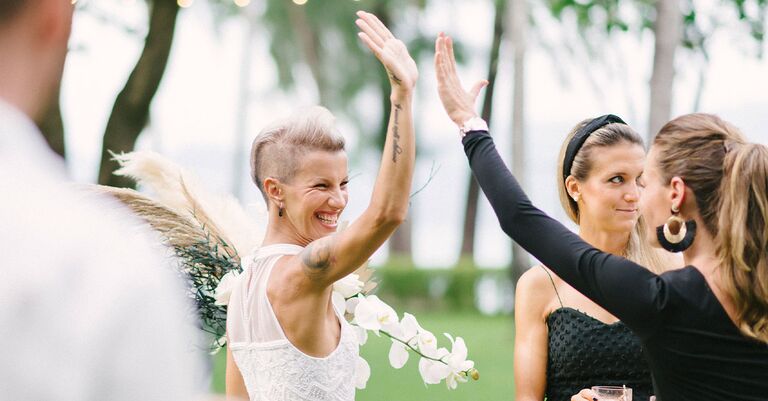
15. Make Your Guest List
By now, you already have a general idea of how big your wedding will be thanks to the previous wedding planning you've already completed. Once you have a ceremony or reception site booked, for instance, you're going to be limited by how many people it can accommodate. But beyond that, consider what you want the flow of the day to look like. Would you rather have quality one-on-one time with each guest or throw a once-in-a-lifetime party for all your friends and family? This will affect the exact number of people you invite. Keep in mind that including more guests in your wedding plans means higher prices, as catering costs are generally calculated on a per-head basis. So, in addition to location, your budget will have a big influence on the size of your guest list.
If your parents will be contributing financially to the wedding, they have a say on the guest list. Work with them (or any other contributors) to determine exactly who will receive an invitation. And, if you're not sure how to create your guest list without drama, use this helpful guide as a resource. (Remember: Only invite those who you truly want to celebrate with!)
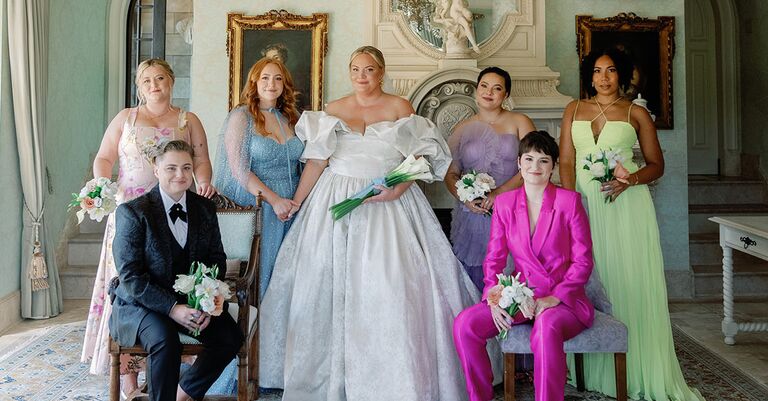
16. Choose Your Wedding Party
Now, it's your turn to propose to your close friends. While having a wedding party isn't necessary, many couples want to be surrounded by bridesmaids and groomsmen as they celebrate their biggest milestone yet.
Remember, the earlier you pop the question, the better. Your wedding party is agreeing to spend their money and donate their time to you, so be considerate and kind by informing everyone about all your plans, including costs for attire, bachelor and bachelorette parties, and more. Your wedding day will feel much more special thanks to your best man, maid of honor, and the entirety of your crew.

17. Take Engagement Photos
While your wedding will be the start of an exciting new chapter, don't skip over savoring your time as a to-be-wed. Before you know it, your engagement will be over and you'll be married. We encourage all engaged couples to take engagement photos. Not only will engagement photos help you enjoy this time in life (pro tip: plan a date night around the photo shoot), but these images are also practical as well. Taking engagement photos will get you comfortable in front of the camera before the big day. Additionally, many couples choose to put engagement photos on their save-the-dates.
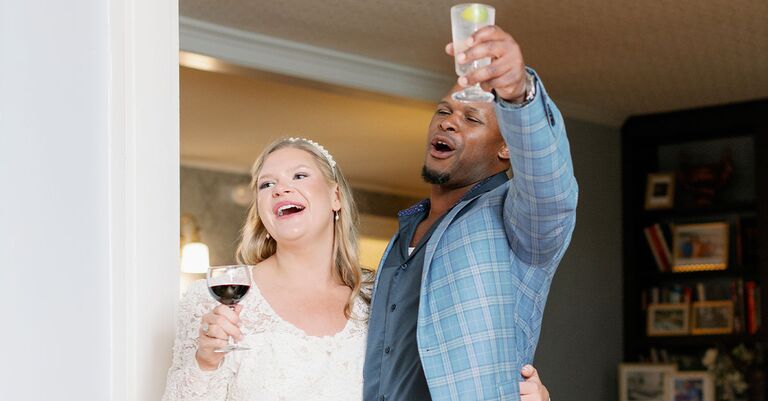
18. Plan an Engagement Party
Another part of savoring the process while planning a wedding is to celebrate with an engagement party. Why wait until the big day to gather your pals? An engagement party is a fun way to kick off your planning and toast to your upcoming nuptials. It's also a great setting for friends and family to meet and get to know each other if they haven't had a forum to do so previously in your relationship.

19. Make Your Wedding Registry
There's no such thing as making your registry too early. With engagement parties, showers and well-wishing relatives in your future, everyone will appreciate your foresight. After all, weddings and gifting are synonymous. And although gifts are optional for some wedding events, like engagement parties, some of your guests may want to give you something to commemorate the occasion. We recommend setting up your wedding registry through The Knot so guests don't have to ask (or guess) what you'd like.
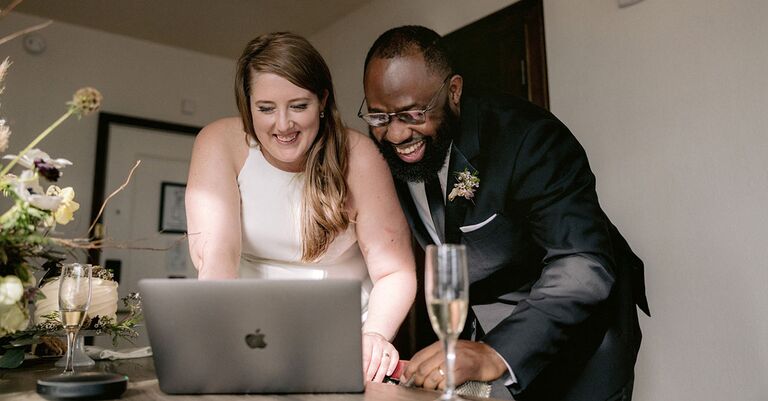
20. Create Your Wedding Website
Your wedding website is equally as important as a wedding registry. While you have this wedding planning guide to instruct you, a wedding website is a helpful tool for loved ones, because it houses all the relevant details about your wedding day, like the date, time, dress code, and transportation logistics you've arranged, like hotel room blocks or shuttle services. Beyond that, it's a place to show off your favorite proposal and engagement photos, as well as local recommendations for those that will travel to your nuptials. (This is especially important if you're hosting a destination wedding.) Create your wedding website early, and update it frequently as you finalize more details. Then, include the link on your save-the-dates and on an insert in your formal invitations so guests know how to find it.
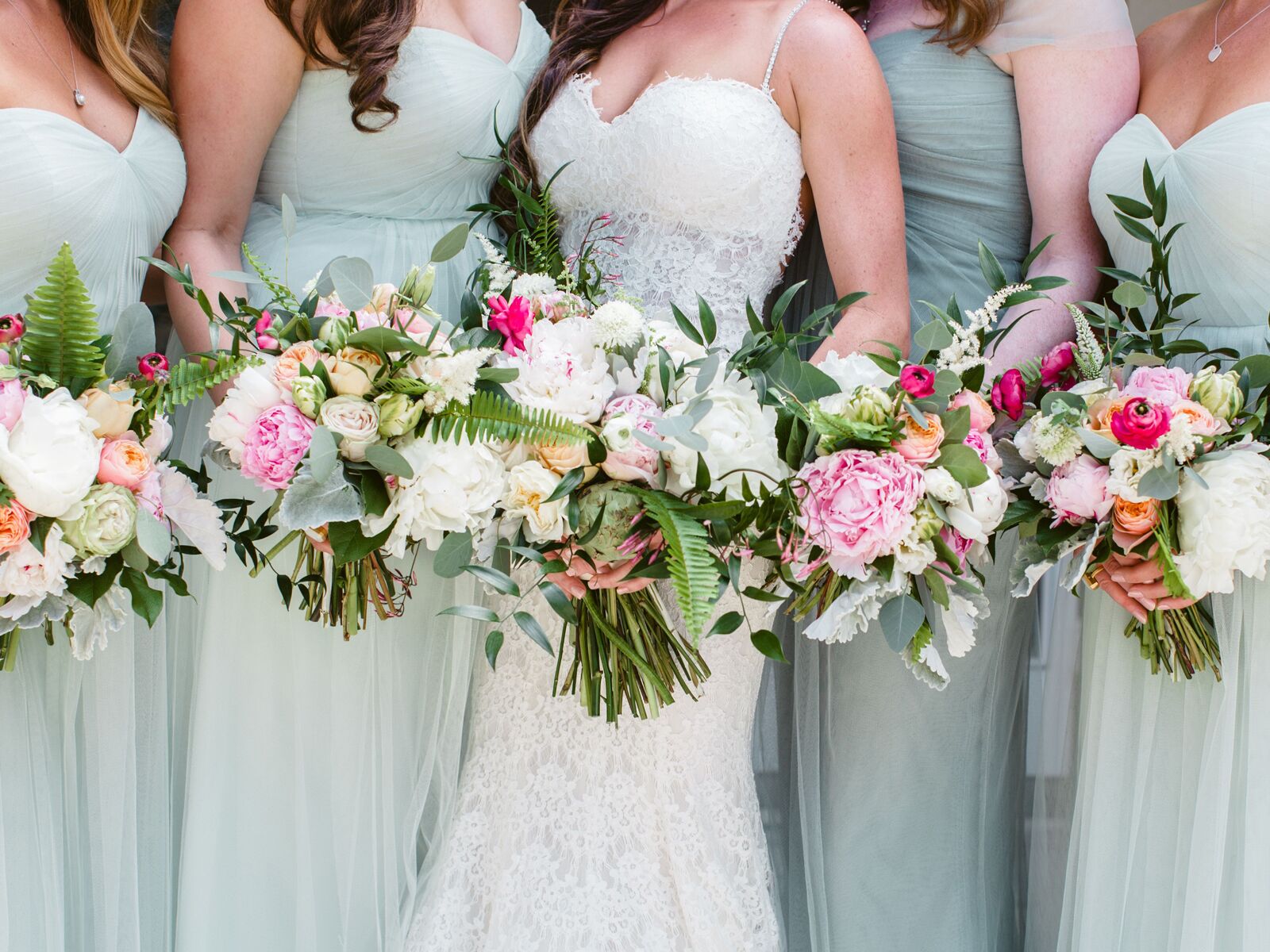
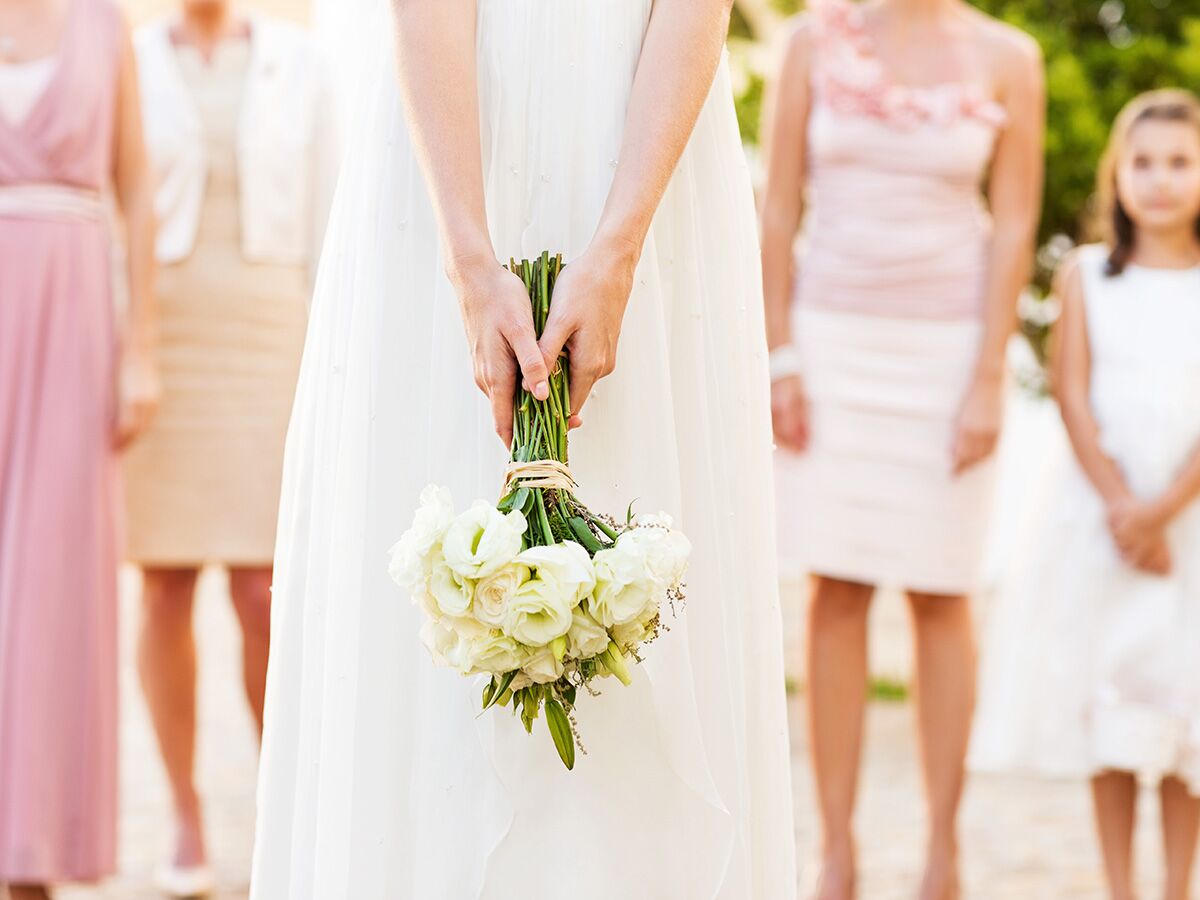
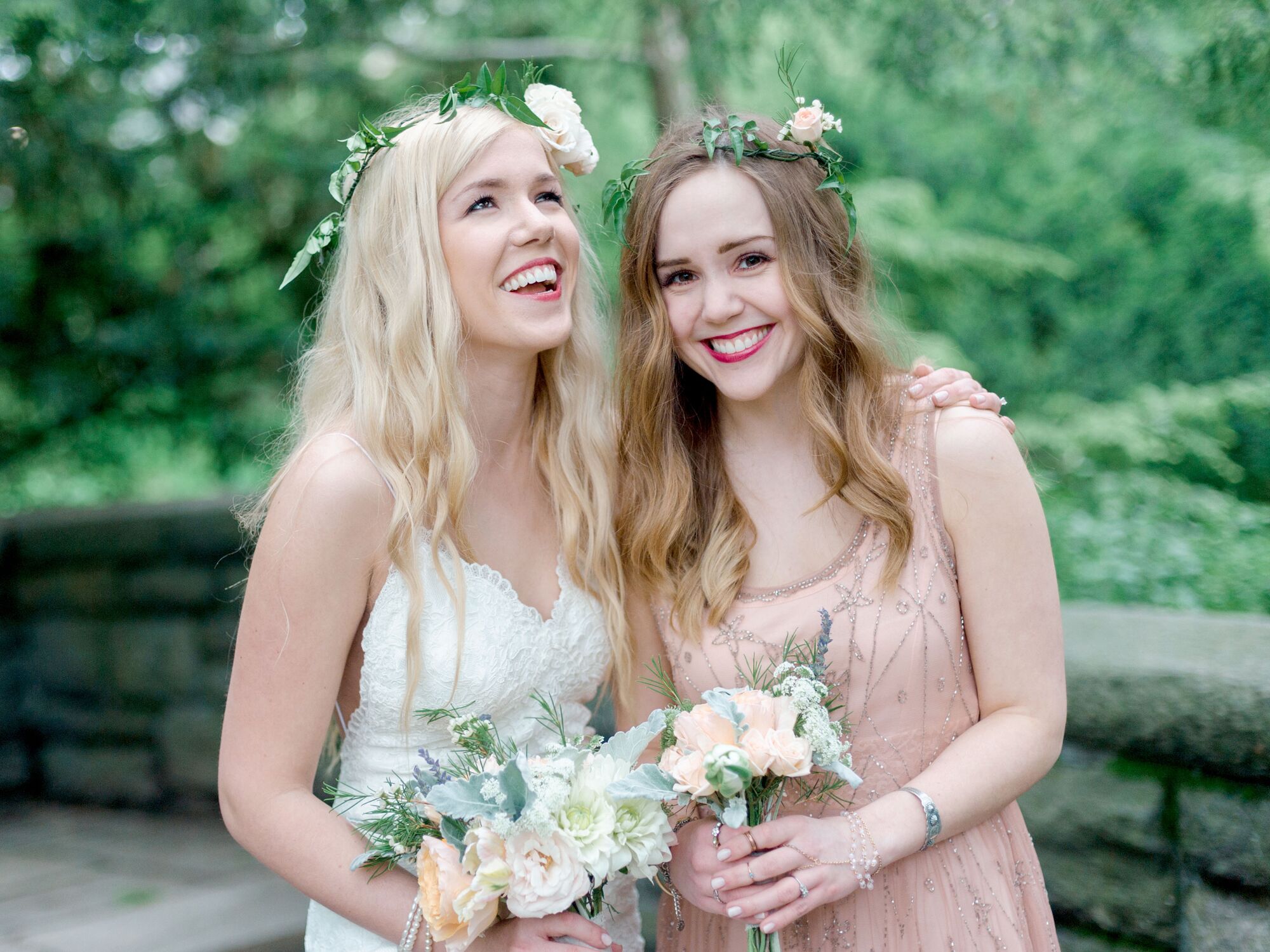
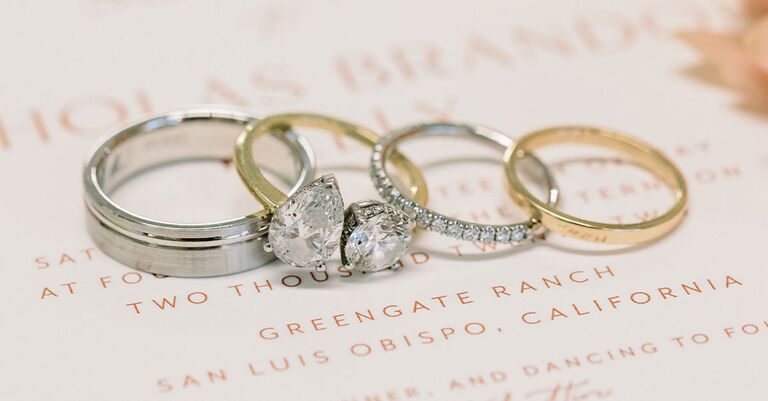
21. Insure Your Wedding
No matter how careful you are, the peace of mind that wedding insurance will give you and your fiancé is worth it, especially after the changes society has experienced over the last few years. And, in addition to insuring your wedding event, we also recommend getting policies for your engagement ring and wedding rings too. You can purchase a jewelry protection policy as an extension of your renter's or homeowner's policy (which would reimburse you for a set amount of cash if you lose the ring), or through a company that specializes in jewelry insurance (which might offer more coverage than a standard homeowner's policy by replacing a lost or stolen ring).
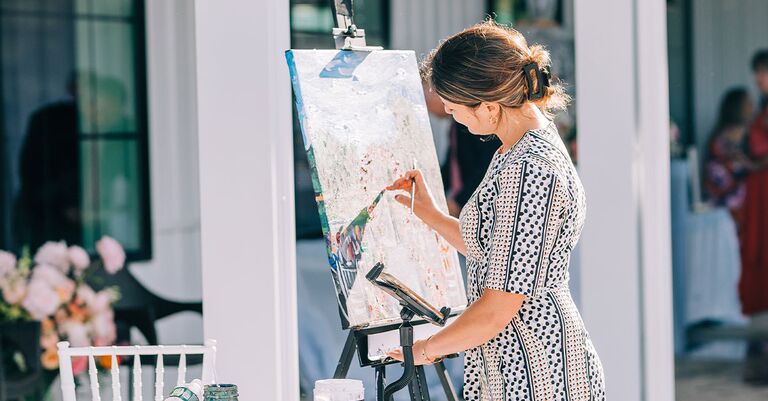
22. Hire the Rest of Your Wedding Vendors
Next on your list of steps to planning a wedding? Filling out the rest of your vendor team. According to The Knot Real Wedding Study, couples hire an average of 14 vendors to make up their wedding vendor team. So even after you've hired your biggest vendors, like your venue, caterer and photographer, there's still some work to be done. You still need to hire the rest of your wedding vendors—like a wedding officiant, transportation company, photo booth, etc.
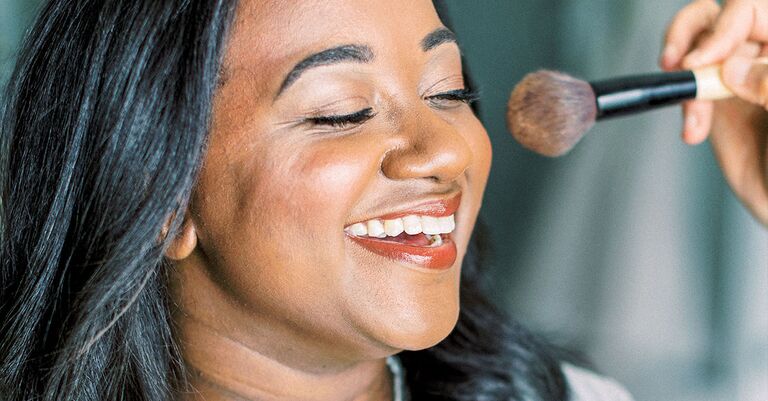
23. Set Your Prewedding Self-Care Routine
We're big proponents of having a prewedding self-care routine in place for the months leading up to the big day. You deserve to treat yourself, after all, because planning a wedding is no joke. While cosmetic treatments are certainly not necessary for your wedding, you may want to experiment with things like teeth whitening kits, sunless tanners, facials, or hair coloring. We recommend starting any new procedures early on, giving yourself time to find what works for you and makes you feel your absolute best. (Read: You don't want to try a new skincare product the week before your wedding day in case it doesn't react well with your skin.)
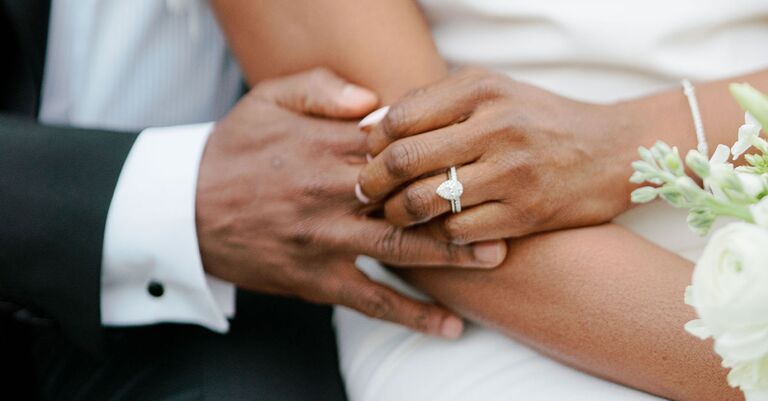
24. Consider Premarital Counseling
Beyond cosmetic rituals, think about how you can prioritize your mental health and your relationship during this season. Now is a great time to attend premarital counseling to set yourselves up for success as a married couple. Be sure to get enough restful sleep, too, as it's the crux of your well-being. And, if you're feeling overwhelmed by wedding stress or "planxiety," it won't hurt to try talking to a therapist or licensed professional who can offer the help you need.
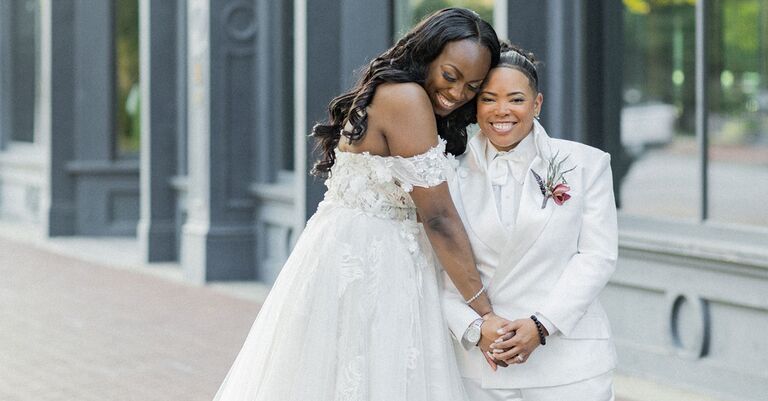
25. Ask Your Partner Questions and Have Honest Conversations
Beyond the logistics of planning a wedding, part of your focus during this season of engagement needs to be on planning for your marriage. Connect with your partner and make sure you're both on the same page about future plans and the shape that you want your marriage to take. Never assume that they see things the same way you do—asking the hard questions is the best way to really dig in and prepare for your life as a married couple.
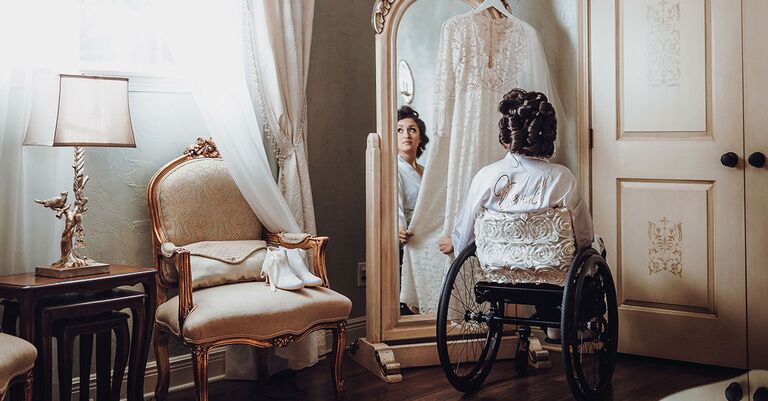
26. Schedule Vendor Appointments
Booking your wedding vendors is a major step in planning a wedding, but signing the contract is only the beginning. Once you have your team assembled, you'll need to meet with each pro to iron out the details. You should plan to partake in site tours with your planner to discuss the reception layout, catering tastings, attire alterations and even hair and makeup trials. Additionally, you'll want to start working with your music vendor on the playlist for the wedding.

27. Plan a Wedding Shower
Don't get too swept up in the steps to planning a wedding. This time in your life is definitely worthy of celebration, so party accordingly! The months leading up to the big day are full of additional wedding events. Often, a couple's close friends, family members or wedding party will take the lead on hosting numerous prewedding events, notably a wedding or bridal shower. You'll be surrounded by your nearest and dearest as they help you welcome this new life milestone, so be present and soak up the joy of every single wedding event.

28. Plan a Bach Party
Next up on the list of prewedding parties to enjoy in the midst of planning a wedding? A bachelor or bachelorette party as a final good-bye to the single life. Amid the hustle and bustle of navigating how to plan your own wedding, you deserve a little break with your besties. A bach party is a great way to kick bcak, relax and celebrate with your crew.

29. Plan a Rehearsal Dinner (& Consider a Welcome Party)
Kick off the wedding in style with an epic rehearsal dinner. A rehearsal dinner is a great way to spend some extra time with those closest to you—your wedding VIPs. After the wedding ceremony rehearsal, enjoy an intimate dinner with your family and wedding party before celebrating the wedding you worked so hard to plan!
Additionally, if you have a lot of out-of-town guests coming to your wedding, you might want to consider a welcome party that has a bigger guest list than the rehearsal dinner. This is a nice way to set the mood with guests and just have fun. The welcome party and rehearsal dinner could be on different dates, or the welcome party could follow right after the rehearsal dinner on the same day. It's up to you, but just remember—more parties means more special memories you'll cherish!

30. Think About Planning an After-Party
Wanna keep the fun times rolling even after the wedding comes to an end? Consider adding in an after-party to your wedding plans. The best thing about an after-party is that, unlike planning a wedding, there are absolutely no rules or expectations so you can make the late-night gathering take any shape you see fit.

31. Consider Planning a Day-After Brunch
What comes after the after-party? The day-after brunch and recovery day! Many couples, especially those planning full wedding weekends, are adding one final day-after event to bid adieu to their guests in style. This is a nice way to wrap up the weekend and spend a little extra time with loved ones before they jet home. Plus, if your guests are feeling a bit hungover from the wedding, they'll be grateful for a tasty breakfast before traveling home.

32. Tackle Your Wedding Stationery: Invitation Design, Postage & Mailing
As your big day draws closer, you'll need to alert guests with beautiful wedding invitations. But, believe it or not, your stationery suite includes more than just save-the-date cards, formal invites, postage and RSVP cards. Consider what you want all of your paper goods to look like, from place cards, menus, ceremony programs, and wedding favor tags. Each plays a role during the day, and having a consistent design among all will make your wedding look seamlessly cohesive.

33. Shop for Wedding Attire
One of the most exciting outcomes of successfully learning how to plan a wedding is shopping for attire. Begin your search by browsing wedding dress and suit ideas online, and don't forget to save your favorites to take them with you to your appointments. Then, learn the lingo before setting foot in a store. If you're shopping for a wedding dress, read up on silhouettes, necklines, trains and hues that you're interested in trying. For those shopping for a suit, consider whether you want a traditional suit or a sleek tuxedo. We also recommend considering whether you'll buy or rent your outfit.
When it comes to wedding attire, we recommend shopping as early as you can. Custom orders, as well as tailoring, can take months. Plus, you'll need additional time for touch-ups and alterations.
This is also a good opportunity to start thinking about your wedding's dress code. This isn't mandatory, but if you have a particular level of wedding attire formality in mind, whether it's black tie, semi-formal, cocktail or casual, it's time to nail that down.
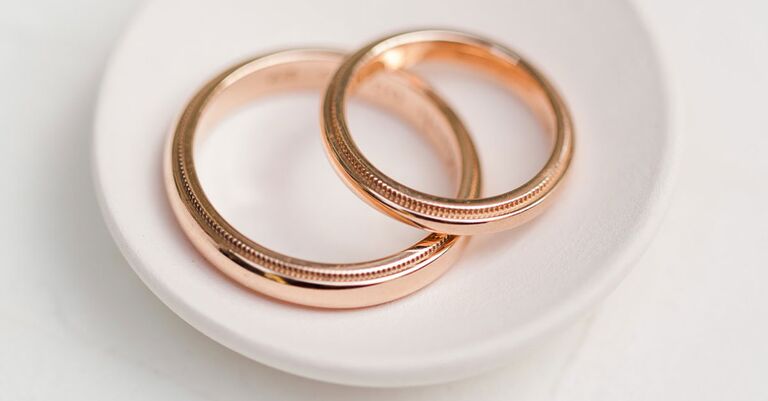
34. Shop for Wedding Rings and Jewelry
Spend some time thinking about how you can showcase your personality through all aspects of your wedding day outfit, from the actual clothing to the colors and even your accessories too. "Oftentimes, additional accessories like jewelry are forgotten, but they're equally as important as the rest of your attire," says Lisette Scott, founder of jewelry brand Jam+Rico. "All of these pieces will complete your look on your special day."
While you can personalize your wedding day through decorations and accent details, fashion is another way to express yourself and tell your story to loved ones. "Personalizing your wedding is what will make that day memorable for you and your guests," Scott adds. "Unique touches of jewelry that have symbolic meaning of your heritage and culture can begin to tell a meaningful story."

35. Show Gratitude & Shop for Gifts for VIPs
While planning a wedding is about you and your partner, there are a lot of loved ones and VIPs that are helping bring the big day together. As such, no wedding planning guide would be complete without the reminder to show gratitude and shop for gifts for close loved ones. Whether it's a small thank-you note to your nephews for serving as ushers or a gift basket for your maid of honor, a display of gratitude is a must.

36. Make a Hotel Room Block
Wondering where all your out-of-town guests will stay? Work to secure hotel room blocks at a couple of nearby hotels so guests can book their accommodations at ease and at a discounted rate. Plus, having all of your guests consolidated to just a couple of hotels will make things like transportation logistics and welcome bag deliveries simpler.

37. Think About Your Honeymoon
While you're certainly wrapped up in how to plan a wedding, don't forget your honeymoon too! You and your S.O. will want to enjoy some much-earned R&R after the big day, so think about what kind of honeymoon you'd like to take, and when. You certainly don't have to set foot on a plane immediately after your wedding reception ends, though can if you'd like. At the very least, consider taking a minimoon first before a full-blown honeymoon at a later date. After all, don't you want to ring in newlywed life with a hot tub and a chilled glass of champagne?
To be sure you have enough time to plan your postwedding getaway, stay on top of key deadlines for renewing your passports, booking flights, and securing lodging and extra activities. And if the thought of planning a vacation on top of your wedding sounds like an added stressor, we recommend working with a honeymoon travel agent. Not only will they hook you up with VIP perks and benefits, most of their services are free too.
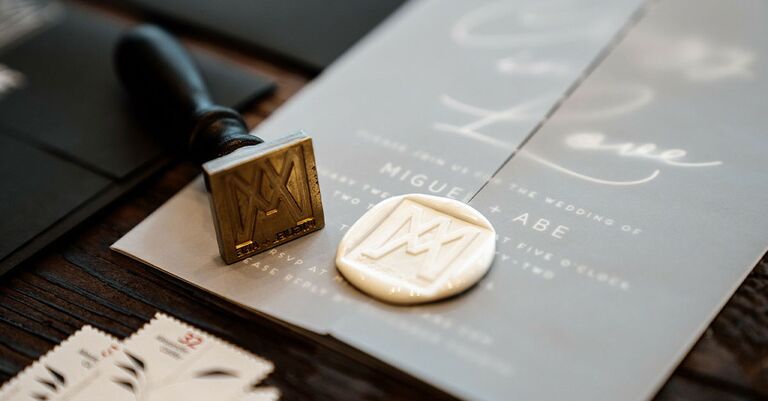
38. Prioritize Personalized Details
Here's where you can really make your wedding day shine. Paying attention to thoughtful, personalized details is what's going to make your guests walk away thinking, "Wow, that was so them."
If you're a self-proclaimed DIY expert, perhaps you'd like to hand-letter your own wedding signage. Or, if your first date was spent over tacos and margaritas, make that the center of your wedding menu. If you're movie buffs, consider naming your reception tables after your favorite flicks. You can even serve a signature cocktail named after your pets if you'd like. The options are endless when it comes to how you can personalize your wedding day. And if you want yours to be a memorable affair, focus your attention here. Also, if you're writing your own wedding vows, you'll want to avoid leaving those to the last minute.
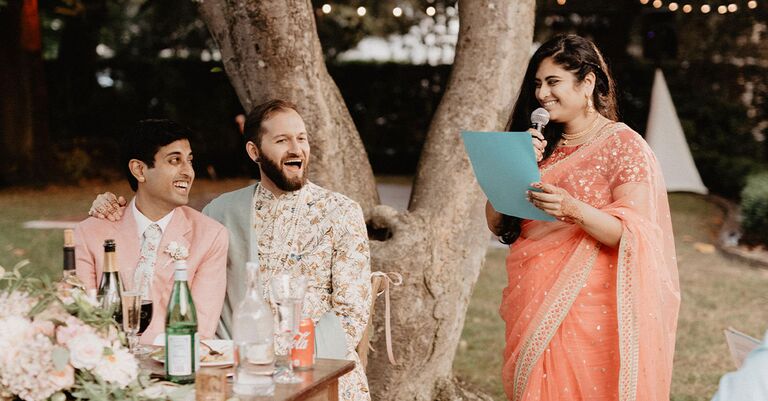
39. Designate Key Roles
Who is going to take home all of your wedding cards and gifts at the end of the night? Will you have a reader during the ceremony? What about ushers to guide wedding guests to their seats? Beyond your wedding party, there are some other wedding roles that you'll need to designate ahead of the big day as part of the steps to planning a wedding.
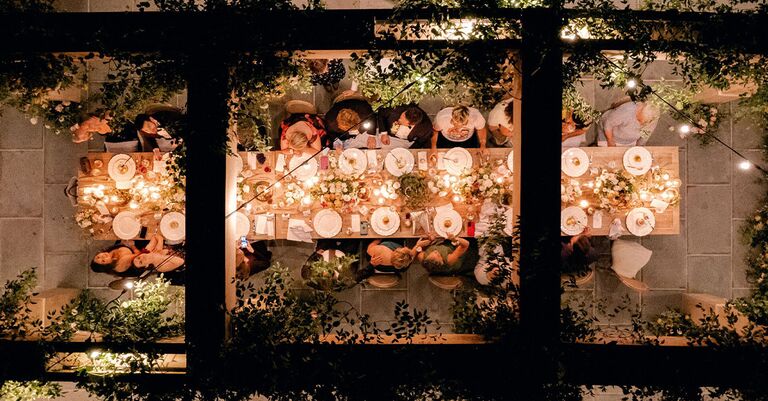
40. Collect RSVPs and Pivot Plans as Needed Based on Replies
While you have a guest count target in mind, you won't actually know how many wedding guests you're having until the RSVPs start to roll in. And as they do, you can start working on tasks like creating a seating chart. At this time you might also decide to extend some invitations to your B-list if you have extra space.
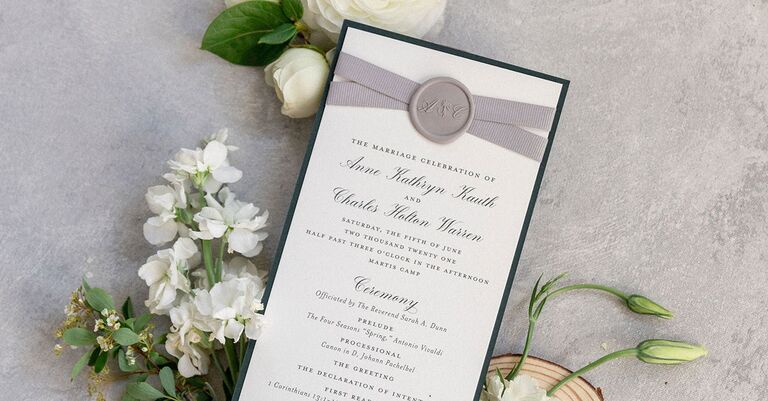
41. Don't Forget the Little Details
They say the devil's in the details, but in this case the key to how to plan your own wedding is in the details. From unity ritual supplies to day-of stationery and even exit toss materials and a cake knife, it's important that you take stock of all the loose ends and minutiae you need to organize, gather or purchase before the wedding day. Do you want some amenities for guests in the bathrooms? Do you need blankets or fans to keep guests comfortable? These are the kinds of questions to be asking at this stage of your wedding planning journey.

42. Make a Wedding Emergency Kit
While the little details mentioned above are things you're planning for, you also need to be prepared for unexpected things to pop up. What happens if your wedding dress rips? Or the best man gets a splinter? Or your mother gets a stress-induced headache? Preempt the worst-case scenario by creating a fully stocked emergency kit that has any and everything you could possibly need at a moment's notice.
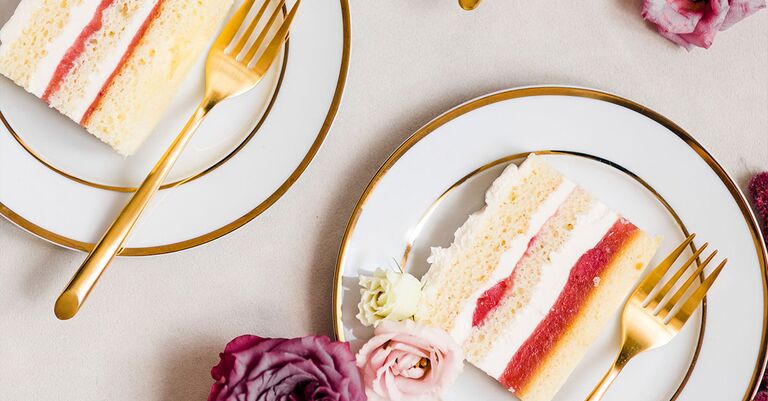
43. Finalize Details With All Vendors & Prepare Vendor Tips
As the big day draws near, you'll need to tie up loose ends, from giving the catering company a final headcount to ironing out transportation details. You should make sure to double-check details like vendor arrival times and confirm that their vendor meal needs will be met.

44. Make and Distribute Wedding Timeline
Do the groomsmen know where to be and when? Do your aunts know to hang back after the ceremony for extended family portraits? Having a timeline for key wedding stakeholders will ensure things go smoothly. While your wedding planner likely has a production timeline for their vendors, this timeline is separate from that, but just as important.
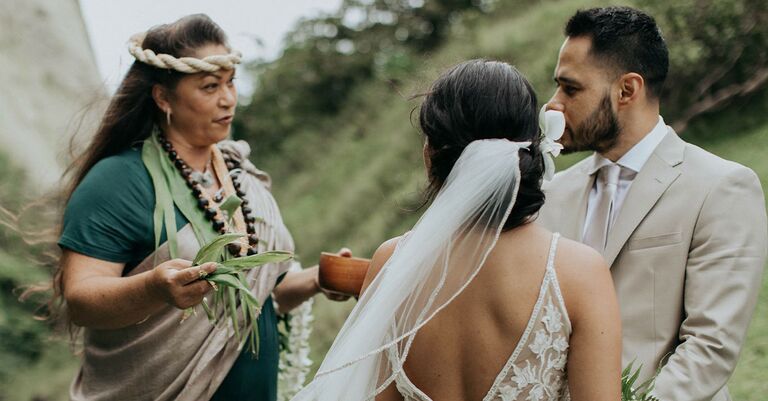
45. Stay in Communication With Your Wedding Pros
Consider this the golden rule of wedding planning: There's no such thing as over-communicating with your vendors, according to the pros themselves. "Be sure to have a clear idea of what you want and communicate to everyone," Thornton recommends. It's for this reason that having a planner or coordinator can be a major benefit, especially when you need to streamline dialogue between everyone in the final weeks before the wedding. "Wedding planners know exactly what you need, and they can relieve the pressure of back and forth with vendors," Holloway advises.
Whether you've enlisted a planner or you're handling it yourself, aim to have regular communication with your professional team. This will keep everyone aligned on timing, logistics, and expectations, and it'll eliminate miscommunication and confusion. When it comes to your wedding day, there's no such thing as being too organized.

46. Apply for a Marriage License & Make Legal Decisions
Did you know that getting married comes with paperwork? Before the wedding date, you'll need to apply for a marriage license—after all, this is your ticket to becoming legally wed, and it's one planning task not to leave until the last minute. Then, after the wedding day, you'll need a marriage certificate, which proves you're legally married. Both documents need to be notarized, but specific timing guidelines vary by state and county. "It's important to do your research on the timelines and deadlines for the location or county where you're getting married so you understand what you need and when," says Pat Kinsel, Founder & CEO of digital notary site Notarize. "If you're not sure, contact the city or town clerk where you are getting married to get confirmation on the timeline and deadlines for documentation."
In some states, marriage licenses are only valid for a short period of time, so it's vital to complete this wedding planning task in a timely matter. "In most cases, your marriage license needs to be obtained within a certain time period before the wedding and may not be officially filed within a certain time window as well," Kinsel adds. "For example, if you're getting married in New York, a marriage license is only valid for 60 calendar days beginning the day after it is issued, and the marriage ceremony may not take place within 24 hours from the time the license is issued. Meanwhile, some counties in California allow you to obtain the license up to 30 days prior to the wedding and the official license must be filed within a few days or weeks." Additionally, you and your partner should discuss other legal matters like whether any name changes will happen and how you'll handle finances after getting married.
47. Consider the Guest Experience
According to The Knot Real Wedding Study, when asked what was most important to couples during their planning process, 74% of respondents said they wanted guests to be well taken care of and to have a good time. Take time to plan out details to enhance the guest experience, from favors to amenities like welcome bags.

48. Take Time to NOT Plan
By now, we've covered exactly how to plan a wedding. But here's one planning task you won't find everywhere: Take time to actively not plan your wedding too. Planning your nuptials is a big undertaking; it may as well be the first big test of your marriage. It's a long (but rewarding) gauntlet of compromise, sacrifice and stress management.
Before your wedding, take time as a couple to do anything but wedding planning. Have regular date nights with no wedding talk allowed. It's more important than ever to prioritize your relationship and continue dating each other. It will help you remember why you're doing all of this in the first place. "You have already done the hard part, which is finding your life partner," Thornton advises. "This is the celebration of your love with the people closest to you. Don't forget that and how special your wedding day is... and enjoy yourself!"

49. Express Gratitude
You did it! You made it to the end of your wedding planning journey. But you didn't come all this way on your own. Take time to express gratitude to everyone, from family to vendors, who helped make your wedding day a reality. In addition to tips and thank-you cards for vendors, leaving a positive review online is a great way to express your appreciation.

50. Plan Your Postwedding To-Do List
Before you leave on your honeymoon, take some time to create a to-do list of all the items you need to deal with once you return. From name changes to writing thank-you cards and creating a photo album, there are a few loose ends you'll need to tie up after the wedding to fully complete your wedding planning adventure.
Kim Forrest and Sarah Hanlon contributed to the reporting of this story.












